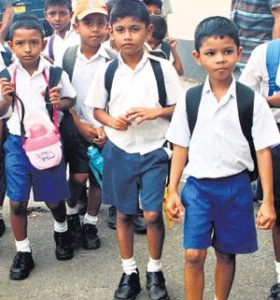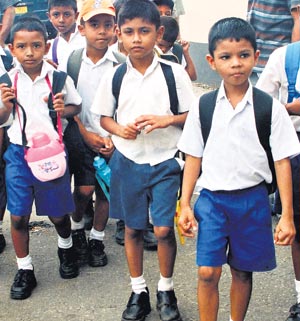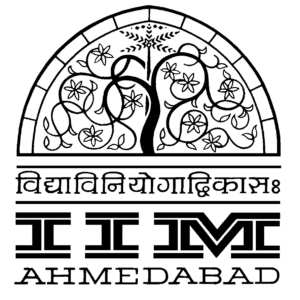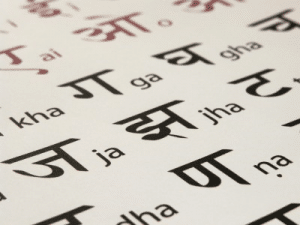In an effort to prevent children from dropping out of schools, the education department of Karnataka  will allot a unique 16-digit identity code to each student studying in schools across the state which will help track dropouts from Class I to SSLC.
will allot a unique 16-digit identity code to each student studying in schools across the state which will help track dropouts from Class I to SSLC.
Speaking to reporters on Thursday, primary and secondary education minister Vishveshwara Hegde Kageri said: “The unique code will help track students who disappear from schools every year and re-enroll them. It will also help check the authenticity of teachers’ inputs.”
“The code, to be called ‘child tracking system’ will be uploaded on the website designed by the department. One crore children across the state will be covered under the scheme. The process of allotting codes to schools has reached the final stage. The code will be given as soon as possible,” Kageri said.
“The code will help track school dropouts and prevent students becoming child labourers and straying into unlawful activities,” he said.
When asked about when the new system will be in place, Kageri said the department will have to give the unique code to one crore students. “It will be implemented soon,” he said.
Asked about the controversy over starting a medical college at Sirsi or Karwar, Kageri said the decision should be seen as a need-based one instead being seen as politically motivated.
“Close to 12,000 teachers’ posts are vacant in primary schools across the state and the finance department agreed to only sanction 4,000 posts. Permanent recruitment of teachers has already been started,” the minister said, adding for the vacant posts, the department will hire teachers in educationally backward regions where the student-teacher ratio is poor.











 Pre-primary admission to non-state board schools in Mumbai that usually start in the end of October or beginning of November has been postponed at least till December over continuing confusion on the latest amendment to the Right to Education (RTE) Act.
Pre-primary admission to non-state board schools in Mumbai that usually start in the end of October or beginning of November has been postponed at least till December over continuing confusion on the latest amendment to the Right to Education (RTE) Act.
 Every student should have a choice of concurrent education in all learning domains, said eminent nuclear scientist Dr Anil Kakodkar. Every student should have a choice of concurrent education and training in all learning domains including opportunities to do so across institutions,” he said while delivering a lecture on ‘Transforming India Through Quality Higher Education’.
Every student should have a choice of concurrent education in all learning domains, said eminent nuclear scientist Dr Anil Kakodkar. Every student should have a choice of concurrent education and training in all learning domains including opportunities to do so across institutions,” he said while delivering a lecture on ‘Transforming India Through Quality Higher Education’.
 Recognising the positive role of moral education in sensitising children towards the elderly, the Social Justice and Empowerment Ministry has asked NCERT to look into the possibility of resuming moral and value-based education at elementary level.
Recognising the positive role of moral education in sensitising children towards the elderly, the Social Justice and Empowerment Ministry has asked NCERT to look into the possibility of resuming moral and value-based education at elementary level.
 Declaring that Asia’s rise is “unstoppable”, Australia today unveiled an ambitious plan aimed at forging deeper links with India and other booming economies of the region, including through teaching languages like Hindi and Mandarin in its schools.
Declaring that Asia’s rise is “unstoppable”, Australia today unveiled an ambitious plan aimed at forging deeper links with India and other booming economies of the region, including through teaching languages like Hindi and Mandarin in its schools.


 The Central Advisory Board on Education (CABE) will meet on November 1 to take a final call on a slew of proposed reforms in the teacher education system. The sweeping reforms were recommended by a Supreme Court-appointed high-powered commission under former Chief Justice of India J S Verma.
The Central Advisory Board on Education (CABE) will meet on November 1 to take a final call on a slew of proposed reforms in the teacher education system. The sweeping reforms were recommended by a Supreme Court-appointed high-powered commission under former Chief Justice of India J S Verma.
 The Central Board of Secondary Education guides its schools to undertake various awareness programmes to promote awareness among students from the beginners’ level. The coming week from October 29 will be observed as a ‘vigilance awareness week’ to make students aware about corruption throughout the CBSE schools.
The Central Board of Secondary Education guides its schools to undertake various awareness programmes to promote awareness among students from the beginners’ level. The coming week from October 29 will be observed as a ‘vigilance awareness week’ to make students aware about corruption throughout the CBSE schools.
 An International Symposium on “Flexible Models for Skill Development” was jointly organized by the National Institute of Open Schooling (NIOS) and Open Polytechnic of New Zealand, here, yesterday. Thanking the Open Polytechnic of New Zealand for sharing their experiences in the field of vocational education, Sri Kapil Sibal, Union Minister for Human Resource Development, pointed out the enormous potential of the work force in India which was growing at a rate of 1.7% annually. However with a capacity for vocational training limited to just 3 million annually vis-a-vis the demand of about 10 million, the challenge is to bridge this gap by providing the required skill base. He added that imparting these skills should include an element of continuum giving students the ability to learn and unlearn making the system flexible. This also requires development of standards in skill development by recognizing existing skills, getting State Education Ministers to map the skills required in various localities of their states, by means of which industry can work with these localities would provide skill training in these areas.
An International Symposium on “Flexible Models for Skill Development” was jointly organized by the National Institute of Open Schooling (NIOS) and Open Polytechnic of New Zealand, here, yesterday. Thanking the Open Polytechnic of New Zealand for sharing their experiences in the field of vocational education, Sri Kapil Sibal, Union Minister for Human Resource Development, pointed out the enormous potential of the work force in India which was growing at a rate of 1.7% annually. However with a capacity for vocational training limited to just 3 million annually vis-a-vis the demand of about 10 million, the challenge is to bridge this gap by providing the required skill base. He added that imparting these skills should include an element of continuum giving students the ability to learn and unlearn making the system flexible. This also requires development of standards in skill development by recognizing existing skills, getting State Education Ministers to map the skills required in various localities of their states, by means of which industry can work with these localities would provide skill training in these areas.











